The Benefits of Introducing Younger Players to Strategic Games
At FOGYX, we believe that introducing younger players to strategic games can offer a range of benefits that go far beyond entertainment. These games help children and teens develop critical thinking, problem-solving abilities, and even social skills that can serve them well in real life. In this article, we’ll explore the advantages of strategic games for younger players and why they’re an excellent choice for parents looking to balance fun and education in their children’s gaming experiences.
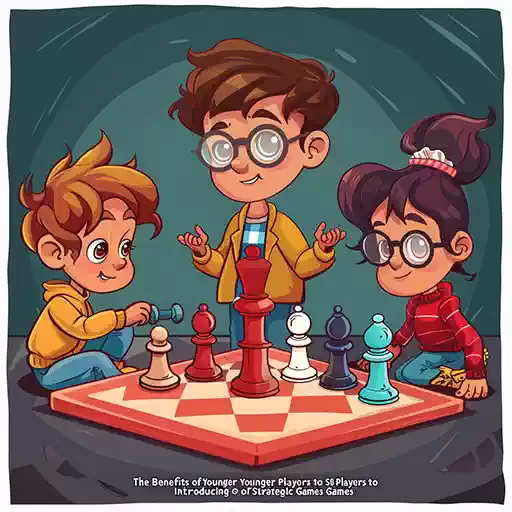
1. Developing Critical Thinking Skills
One of the most significant benefits of strategic games is their ability to nurture critical thinking skills. In a world where decision-making and problem-solving are essential, strategic games offer younger players the perfect environment to practice these abilities in a fun and engaging way.1.1 Encouraging Analytical Thought
Unlike games that rely purely on fast reflexes or luck, strategic games require players to think deeply and plan ahead. Whether they’re building civilizations, managing resources, or leading armies into battle, players must analyze their current situation, predict possible outcomes, and choose the best course of action.For example, in popular free games like Clash of Clans or Plants vs. Zombies, players must carefully plan how they’ll allocate resources to defend their base or outsmart waves of enemies. These decisions involve considering multiple variables at once, fostering the development of analytical thinking—a skill that will serve young players in school and beyond.
1.2 Long-Term Planning and Strategy
Many strategic games are built around long-term goals that require consistent planning and adaptation. Unlike quick, reaction-based games, strategy titles demand that players think several steps ahead, weigh the consequences of their actions, and be prepared for changing circumstances. This type of long-term planning is crucial not only in games but also in academic settings and real-world situations.For younger players, learning to approach challenges with patience and foresight is a valuable lesson. It teaches them that success often comes from careful planning and that setbacks are opportunities to adjust their strategy rather than reasons to give up. This mindset is key to building resilience and grit in both games and life.

2. Problem-Solving in Real-Time
Strategic games place players in complex, often unpredictable environments where they must solve problems as they arise. This real-time problem-solving element is an excellent way to keep young players on their toes and foster adaptive thinking.2.1 Learning from Mistakes
In strategy games, mistakes are inevitable. Whether it’s mismanaging resources, underestimating an opponent, or making a poorly timed move, players will face consequences for their decisions. However, these games also encourage players to learn from their mistakes, adjust their tactics, and try again.This trial-and-error learning process teaches younger players that failure is not final—it's a stepping stone to success. When players see how changing their approach can lead to better results, they build confidence in their problem-solving abilities. Games like Minecraft or StarCraft exemplify this learning experience, where players must adapt to shifting challenges and overcome them with creativity and persistence.
2.2 Handling Pressure and Making Decisions
Many strategic games involve time constraints or competitive elements, requiring players to make quick yet thoughtful decisions under pressure. This aspect of decision-making under pressure is a valuable skill that can help younger players manage stress in both academic and personal environments.For instance, in games like Fortnite or League of Legends, players must think on their feet, balancing short-term actions with long-term strategy. The ability to stay calm, assess the situation, and act decisively is crucial in these high-pressure scenarios. Over time, young players will build their confidence in handling stressful situations—a skill that will benefit them far beyond the gaming world.
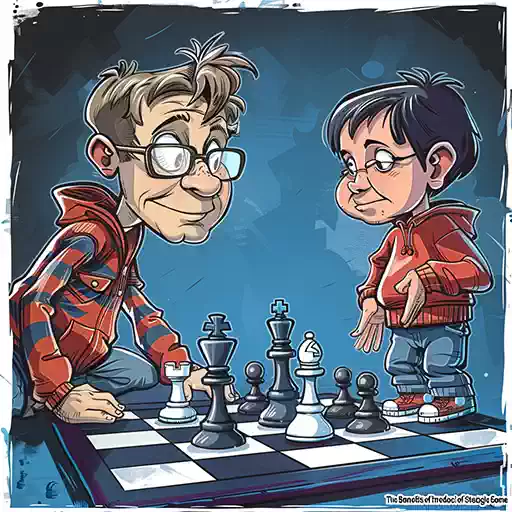
3. Building Social Skills and Collaboration
Contrary to the stereotype of video games as solitary activities, many strategic games promote teamwork and social interaction. By engaging with others, younger players can develop essential communication and collaboration skills that are critical in both school and personal relationships.3.1 Team-Based Strategy and Cooperation
Many strategic online games are designed around team-based gameplay, where players must work together to achieve a common goal. In games like Valorant or Overwatch, teams must strategize, communicate effectively, and rely on each other’s strengths to succeed. This kind of teamwork fosters a sense of community and teaches young players the value of collaboration.Learning to work as part of a team also helps players understand the importance of different perspectives. Each team member brings a unique approach to problem-solving, and younger players will learn how to compromise, negotiate, and support their teammates to achieve the best outcomes.
3.2 Conflict Resolution and Sportsmanship
Strategic games also expose players to situations where conflict may arise, whether it's over resources, strategies, or competition. Learning to resolve conflicts amicably, deal with defeat gracefully, and celebrate wins humbly are all essential parts of developing good sportsmanship.For instance, in multiplayer strategy games like Age of Empires or Civilization, players may face defeat after a long campaign. Learning to accept losses with grace, analyze what went wrong, and plan for future improvements is an important life skill. Similarly, celebrating victories without gloating teaches younger players the value of respect and humility in competitive environments.
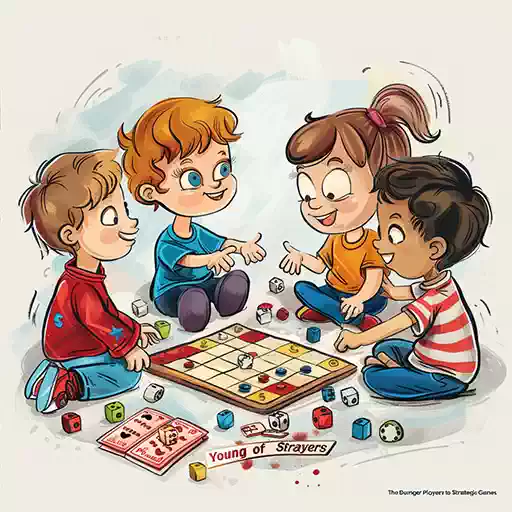
4. Cognitive Benefits and Academic Transfer
There is a growing body of research that suggests playing strategic games can enhance cognitive abilities that transfer to academic success. Games that encourage critical thinking, memory, and concentration often translate these skills into the classroom.4.1 Boosting Memory and Attention
Strategic games often require players to remember key details, such as resource allocations, enemy movements, and previous decisions. This reliance on memory and attention to detail helps young players sharpen their cognitive skills in ways that benefit them academically. Whether it's remembering historical facts in a history class or focusing on complex math problems, these mental exercises from gaming are invaluable.For example, games like Chess or Hearthstone challenge players to keep track of multiple moving parts, anticipate the opponent’s next move, and plan their own strategies accordingly. This mental juggling is excellent practice for improving working memory and focus—skills that are crucial for success in both school and everyday tasks.
4.2 Strategic Thinking in Education
There is a natural overlap between strategic thinking in games and problem-solving in academic subjects. Games that involve resource management, tactical decision-making, or complex planning are akin to solving puzzles in subjects like mathematics, science, and even literature. The ability to approach problems from multiple angles, think critically about solutions, and adapt strategies is directly transferable to academic tasks.For instance, younger players who enjoy managing the complex systems of strategy games may find themselves excelling in subjects like economics or computer science, where logic, planning, and resource allocation are key components.
5. Encouraging Creativity and Exploration
Many strategy games provide sandbox environments where players have the freedom to explore, build, and experiment with different solutions. This level of creativity encourages young players to think outside the box and explore new ideas without fear of failure.5.1 Creativity in Problem Solving
In games like SimCity or The Sims, players are given tools to create their own worlds and manage them. These types of games encourage creative problem-solving by allowing players to experiment with various approaches to challenges. Whether it’s designing a city layout or managing a family’s daily needs, these games stimulate creativity in ways that traditional learning environments may not.By providing young players with the freedom to explore and create, strategy games help cultivate innovation and experimentation, which are critical skills in today’s rapidly changing world.
5.2 Expanding Curiosity and Learning Opportunities
Many strategic games, particularly those with historical or real-world themes, spark curiosity in young players about the world around them. Games like Civilization teach players about historical events, cultures, and technologies, encouraging them to explore these topics further outside of the game.By incorporating real-world learning into gameplay, these games can foster a love of history, geography, politics, and economics, giving younger players a head start in these subjects. The interactive nature of games can make learning feel less like a chore and more like an exciting adventure.
Conclusion: Why Strategic Games Are Ideal for Younger Players
Strategic games offer a perfect blend of fun and education, making them an ideal choice for younger players. From developing critical thinking and problem-solving skills to fostering creativity and social collaboration, these games provide a range of cognitive and emotional benefits that can help children and teens navigate the complexities of life both in and out of the classroom.At FOGYX, we’re committed to creating online games and free games that challenge players in meaningful ways. By incorporating strategic elements into our games, we not only offer entertainment but also empower younger players to build the skills they need to succeed in a rapidly changing world. Whether they’re managing resources, leading teams, or solving complex puzzles, young players will discover that the lessons learned in strategic games can extend far beyond the virtual realm.
01 February 2025
More articles

In today’s world of online games and free games, players expect more than just captivating stories or stunning visuals—they want immersive experiences that feel as real as possible. One of the key factors in creating this sense of realism is the physics engine that powers the game. Whether it’s the way objects fall, how characters move, or how environmental elements interact, the role of physics is crucial in making games feel believable and engaging.
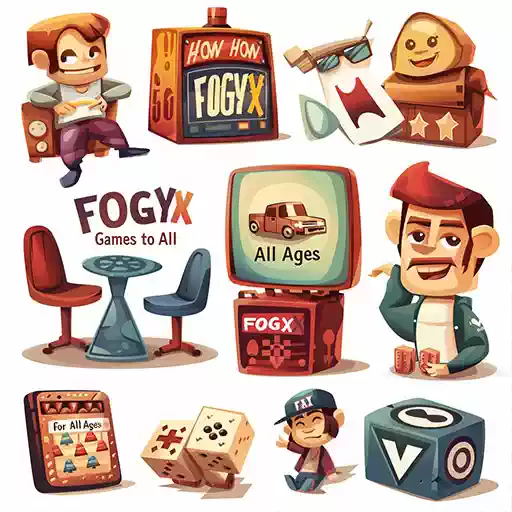
In the world of game development, creating a game that appeals to a broad audience is no easy feat. Different age groups have different tastes, skill levels, and expectations when it comes to games. At FOGYX, we recognize the challenge and excitement of crafting games that can be enjoyed by players of all ages. Whether you’re a casual gamer looking for something simple or a competitive player seeking an intense challenge, our games are designed with the goal of being inclusive, engaging, and—above all—fun.
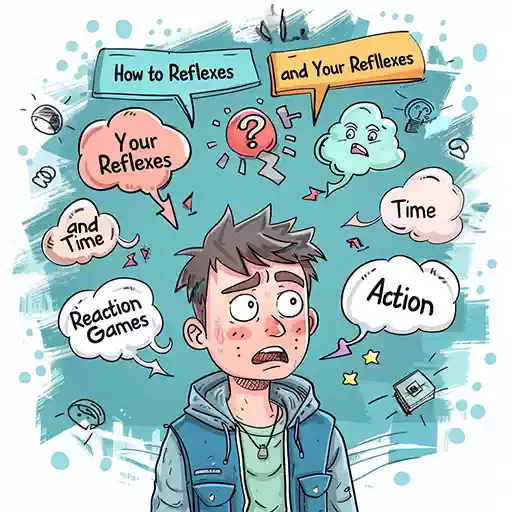
When you’re in the middle of a high-stakes match, whether it’s dodging enemy fire or pulling off the perfect headshot, one thing becomes immediately clear—reaction time matters. In action games, quick reflexes can mean the difference between victory and defeat. If you’ve ever wondered how top players always seem to react faster, anticipate moves, and execute complex actions in split seconds, you’re not alone.
all articles
